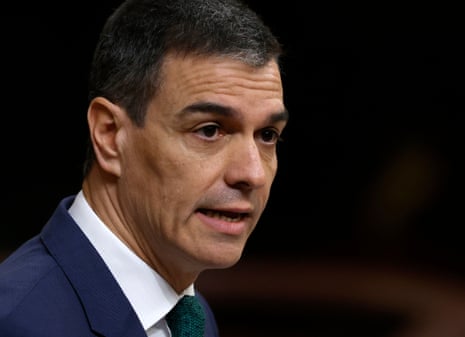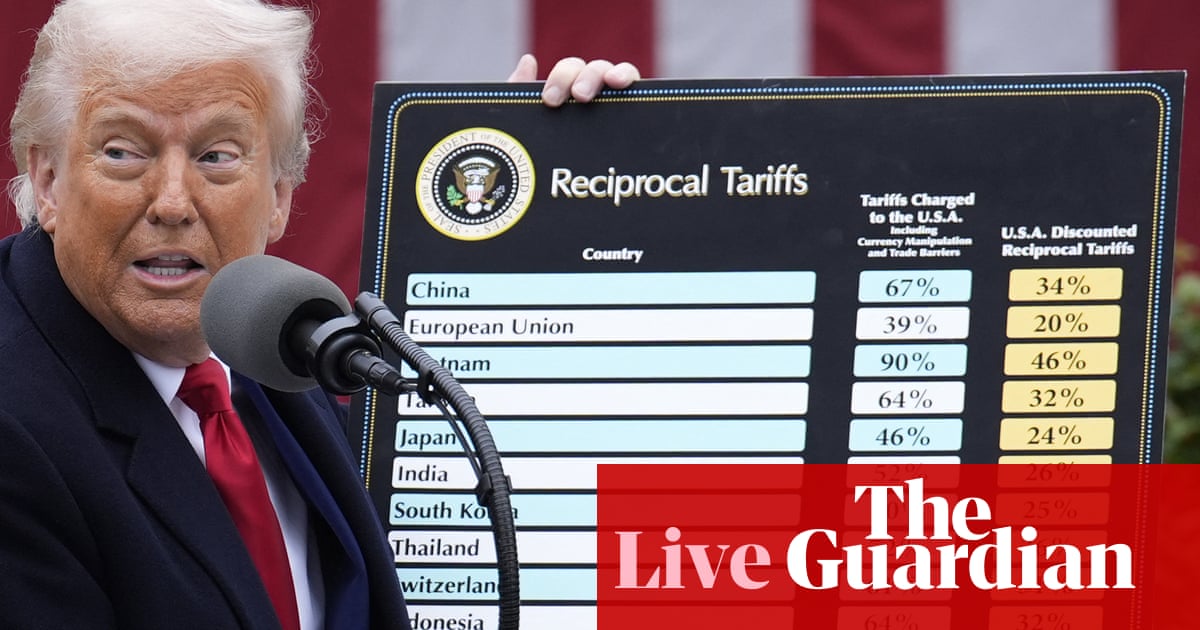Spain puts forward €14.1bn package to support economy in face of Trump’s tariffs
Spanish prime minister Pedro Sánchez criticised the “unprecedented” US tariffs calling them out as a return to “19th-century protectionism,” as he proposed a new €14.1bn package to support the economy in response to Trump’s move.

He also said that Europe should deploy a package of counter-tarrifs and other measures in response, and set up an aid fund financed from revenues from tariffs imposed on the US in return.
In a particularly punchy comment, reported by Reuters, Sánchez said that Europe now faces a trade attack from the West, just as it responds to a military attack from Russia in the East.
The Spanish prime minister is still speaking, and we will bring you more from him soon.
Key events
-
EU trade commissioner says he will speak to US partners on Friday, EU ‘won’t stand idly’
-
Spain puts forward €14.1bn package to support economy in face of Trump’s tariffs
-
US ‘as active as it has ever been’ in Nato, Rubio says, as he seeks to reassure Europeans
-
US state secretary Rubio appears in Brussels at Nato meeting
-
Italy’s Meloni cancels plans in order to focus on responding to Trump’s tariffs
-
Israeli PM Netanyahu visits Orbán’s Hungary despite ICC arrest warrant
-
Spain’s far-right Vox party blames EU for Trump’s tariffs
-
Spanish wine-makers say tariffs are ‘significant blow’ to wineries, will hit US consumers
-
Germany condemns Trump’s decision, warns about impact on global trade
-
US tariffs economic ‘catastrophe’ and challenge for EU, French prime minister says
-
EU to respond in ‘proportionate and decisive way,’ but use of anti-coercion rules only ‘last resort,’ leading lawmaker says
-
EU’s options on responding to Trump’s tariffs
-
German business group denounces ‘unprecedented attack’ on global trade
-
Danish prime minister visits Greenland
-
European stock markets sliding in response to Trump’s tariffs
-
Norway concerned about ‘very serious’ tariffs, hopes to hold further talks with US, prime minister says
-
UK prime minister highlights need for ‘cool and calm heads’ after Trump’s tariffs
-
European reactions to Trump’s tariffs – round up
-
Morning opening: A broken stick
EU trade commissioner says he will speak to US partners on Friday, EU ‘won’t stand idly’
EU trade commissioner Maroš Šefčovič said he will speak with US counterparts on Friday as part of the bloc’s response to last night’s announcements.
In a social media post, he said:
Unjustified tariffs inevitably backfire.
We’ll act in a calm, carefully phased, unified way, as we calibrate our response, while allowing adequate time for talks. But we won’t stand idly by, should we be unable to reach a fair deal.
I’ll speak to my U.S. counterparts tomorrow.
Spain puts forward €14.1bn package to support economy in face of Trump’s tariffs
Spanish prime minister Pedro Sánchez criticised the “unprecedented” US tariffs calling them out as a return to “19th-century protectionism,” as he proposed a new €14.1bn package to support the economy in response to Trump’s move.
He also said that Europe should deploy a package of counter-tarrifs and other measures in response, and set up an aid fund financed from revenues from tariffs imposed on the US in return.
In a particularly punchy comment, reported by Reuters, Sánchez said that Europe now faces a trade attack from the West, just as it responds to a military attack from Russia in the East.
The Spanish prime minister is still speaking, and we will bring you more from him soon.
While Rubio chose not to address the contentious issue of tariffs, French foreign minister Jean-Noël Barrot, who is also in Brussels attending the Nato ministerial, offered his take on the issue.
He warned the new measures will “have negative consequences on the American economy, and on the economies of the alliance’s members as a whole,” Reuters reported.
US ‘as active as it has ever been’ in Nato, Rubio says, as he seeks to reassure Europeans
Rutte opens with expressing condolences about the death of four US soldiers during a Nato training in Lithuania.
He then highlights the new US administration’s desire to “break the deadlock” on Ukraine with Russia, and he pointedly says that European allies step up their spending in response to demands from president Trump.
Rubio thanks for his condolences and stresses that the troops’ participation in training shows that the “US is in Nato, … as active as it has ever been,” as he criticised “this hysteria and hyperbole” about the US and Nato.
The United States President Trump’s made clear he supports Nato. We’re going to remain in Nato. He’s made it clear,” he says.
But he adds that the US wants Nato “to be stronger, more viable” and “invest more in national security.”
“[Trump] is not against Nato. He is against a Nato that does not have the capabilities that it needs to fulfil the obligations that the treaty imposes upon each and every member state,” he says.
He adds that “no one expects that you’re going to be able to do this in one year or two, but the pathway has to be real.”
No questions after their statements, so that’s it.
US state secretary Rubio appears in Brussels at Nato meeting
Meanwhile in Brussels, US state secretary Marco Rubio is taking part in today’s Nato ministerial meeting.
He is appearing at a press conference together the alliance’s secretary general Mark Rutte now.
You can follow it below and I will bring you the key lines here.
Italy’s Meloni cancels plans in order to focus on responding to Trump’s tariffs
Italian prime minister Giorgia Meloni has cancelled all her appointments on Thursday as she wants to focus on the response to Trump’s tariffs, her office said.
La Repubblica reported that she had been expected to attend events in Calabria, but decided to stay in Rome instead.
Earlier today, I brought you her initial response to Trump’s announcement from last night, as she opposed the decision and vowed to “do everything we can to work towards an agreement with the United States, with the aim of avoiding a trade war that would inevitably weaken the West in favor of other global players.”
Meloni was the only sitting European leader to attend Trump’s inauguration in January.
Israeli PM Netanyahu visits Orbán’s Hungary despite ICC arrest warrant
Elsewhere, Israeli prime minister Benjamin Netanyahu is in Hungary today to meet with the country’s prime minister Viktor Orbán, and that’s despite, as AP notes, a warrant for his arrest issued by the world’s top war crimes court.
Instead, Netanyahu was welcomed with military honours at the beginning of his four-day trip, and the two leaders will speak together at a press conference in Budapest later this morning.
The international criminal court in The Hague, the Netherlands, issued a warrant for Netanyahu’s arrest last year over his government’s actions in the Gaza Strip. Hungary criticised it at the time as “outrageously impudent” and “cynical.”
A senior aide to Orbán said today that Hungary would now move to withdraw from the court, “in accordance with the constitutional and international legal framework.”
While that’s a more radical move, a number of other countries previously indicated they would allow Netanyahu to visit without arresting him, including Germany and Poland, while France claimed he had “immunity” from the court’s order.
I will keep an eye on this story for you and bring you the latest.
Spain’s far-right Vox party blames EU for Trump’s tariffs
Sam Jones
The tariff issue has put Spain’s far-right Vox party – devoted fans of Trump and his radical agenda – in something of a bind.
But, reacting to news of the 20% tariffs on EU products, the party’s leader, Santiago Abascal, has chosen to blame … the EU and his political opponents in Spain.
His recent post on X has more than a whiff of diversionary tactics to it. In it, he accuses Ursula von der Leyen, the president of the European Commission, Spain’s Socialist prime minister, Pedro Sánchez, and Alberto Núñez Feijóo, leader of the conservative People’s party (PP) of failing to defend the interests of the Spanish people.
“The People’s party and the Socialists are dragging us into a suicidal trade war,” he wrote.
“Our economy competes on unequal terms because of the ideological bureaucracy of the two-party system. And the only solution they offer is further submission to China, continued wars, and censorship of anyone who speaks out. We must expel this corrupt caste that has only brought ruin and loss of freedoms. And we will do it.”
Spanish wine-makers say tariffs are ‘significant blow’ to wineries, will hit US consumers
Sam Jones
The Spanish Wine Federation (FEV) has described Trump’s imposition of a 20% tariff on EU products as a “significant blow to Spanish wineries”, for whom the US is the second largest export destination, and the No 1 export destination when it comes to sparkling wines.
“The tariffs announced by the US are completely unjustified in the specific case of wine, considering that the current tariff gap between the tariffs applied by the EU and the US is minimal,” the FEV’s director general, José Luis Benítez, said on Thursday.
Benítez warned that the measure would harm not only Spanish wine-makers but also US consumers, “who consume more wine than they produce”.
He also pointed out that the newly announced tariffs would be particularly damaging to small and medium-sized producers, which make up 99% of Spain’s wineries, as they have less capacity to diversify their exports and are more dependent on the main export markets.
The US market represents approximately 13% of Spain’s total foreign sales. In 2024, 97m litres of wine were exported for a value of around €390m.
Germany condemns Trump’s decision, warns about impact on global trade
German chancellor Olaf Scholz said Trump’s decision was “fundamentally wrong” and undermined the free trade globally, as he warned that all countries “will suffer from these ill-considered decisions.”
He said it amounted to “an attack on a trade system that has created prosperity all round the world, itself an American achievement.”
Using similar language, German economy minister Robert Habeck said these were “the most disruptive tariff increases in 90 years,” as he warned of potentially “dramatic” effects of the US president’s decisions.
Speaking at a press conference in Berlin, Habeck said it was “economically wrong” to say that the existing trading arrangements were “of detriment to the US,” as he called to reject this logic and urged nations in favour of free trade to form a united front in response.
Habeck warned that the consequences of these decisions will affect the next federal government and have ramifications “far beyond Germany and beyond Europe.”]
The minister also spoke about countermeasures being prepared in response. He said he was not in a position to show them or announce details yet – although he briefly waves the documents at reporters – but he insisted that “good work has been done there” to prepare for this moment.
He added that he hoped Trump would buckle under pressure, but “the logical consequence is that he has to feel the pressure” from Germany, Europe and other like-minded countries.
Greek finance minister Kyriakos Pierrakakis said that the fresh tariffs imposed by the US government on world trade were a historic shift towards protectionism and a deviation from how the European Union sees economic and social progress, Reuters reported.
“As a country, we are in favour of free trade,” Pierrakakis said in a statement. “We hope that this chapter will last as little as possible.”










